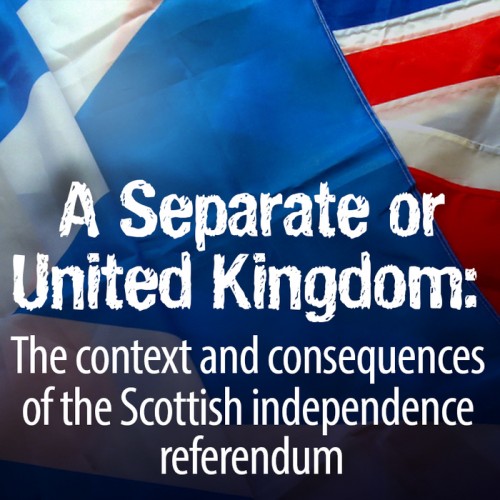 The result of the referendum on 18 September is very uncertain, but its effects have already been felt. Whichever side wins, and whichever path the Scottish people chooses, the real loser of the long referendum campaign has been the quality of public debate, both in Scotland and south of the border. This is not meant as a trivial slight at any irrationality on the part of Scottish voters, or excessive rambunctiousness in the public demeanour of partisans of ‘Yes Scotland’ or ‘Better Together’. If anything, it is to be applauded that the debate has galvanised such high levels of engagement among the Scottish public, culminating in an expected turnout for the referendum of as much as 80%. Instead, it is more a comment that in the supposed contest between ‘head’ and ‘heart’ reasons for which way to vote, it has generally been the very worst aspects of both that have prevailed over their better, and more useful, fellow-arguments. The debate over Scotland’s future has, especially recently, served up the incongruous (and unromantic) image of a nation of ‘bean-counters’ basing its decision about independence on the expected profitability of either outcome, yet calculating this expectation (on either side) off the back of political and economic assumptions that resemble nothing so much as declarations of blind fear or faith.
The result of the referendum on 18 September is very uncertain, but its effects have already been felt. Whichever side wins, and whichever path the Scottish people chooses, the real loser of the long referendum campaign has been the quality of public debate, both in Scotland and south of the border. This is not meant as a trivial slight at any irrationality on the part of Scottish voters, or excessive rambunctiousness in the public demeanour of partisans of ‘Yes Scotland’ or ‘Better Together’. If anything, it is to be applauded that the debate has galvanised such high levels of engagement among the Scottish public, culminating in an expected turnout for the referendum of as much as 80%. Instead, it is more a comment that in the supposed contest between ‘head’ and ‘heart’ reasons for which way to vote, it has generally been the very worst aspects of both that have prevailed over their better, and more useful, fellow-arguments. The debate over Scotland’s future has, especially recently, served up the incongruous (and unromantic) image of a nation of ‘bean-counters’ basing its decision about independence on the expected profitability of either outcome, yet calculating this expectation (on either side) off the back of political and economic assumptions that resemble nothing so much as declarations of blind fear or faith.
The tragedy of this situation is that it really need not have been this way. For a start, much has been ‘left off the table’ in this debate, with both campaigns still defending essentially the same positions they staked out at their respective launches. It has long been clear that the omission of a third ‘devo max’ option alongside ‘Yes’ and ‘No’ in the referendum question flew directly in the face of the majority preference of the Scottish electorate—and ruled out consideration of other confederal possibilities, such as bilateral (fiscal) policy harmonisation agreements, or selective pooling of sovereignty. Worse still, given the wrangles over Scotland’s future currency, the decision by both campaigns to simply stare each other down on the retention (or otherwise) of sterling has ruled out important discussion of the alternatives—from a free-floating ‘Scot£’ or currency peg, to union with sterling or the euro. And the distillation of the whole campaign into a personal contest between Alex Salmond and Alistair Darling has framed the choice as one between the SNP’s catch-all brand of civic nationalism and a Unionism with New Labour characteristics—at the expense of putting into play the ideological diversity on both sides, from the environmentalist republican nationalism of the Scottish Socialists and Greens, to the federalist vision of the Liberal Democrats, and the cautious sovereigntism of the Conservatives.
Another problem is that the quality of information available to the Scottish electorate, and above all the way it has been presented during the campaign, has been woefully low. Both ‘Yes Scotland’ and ‘Better Together’ have sought to capture the ‘factual’ part of the debate with monolithic publications that were high on verbiage, but low on detail, and talked almost entirely past one another. Their transparent lack of objectivity and wildly contradictory results—e.g., Scots would be £1000 better off under independence (‘Yes Scotland’), versus £1400 better off within the Union (‘Better Together’)—have ideologically saturated this side of the debate to the point where ‘official’ data about Scottish independence is no longer trusted. The campaigns have also adopted something of a siege mentality vis-à-vis the many experts who have tried to make sense of Scotland’s many future possibilities, especially on the battleground of fiscal empowerment, attempting to suppress ‘inconvenient’ findings, ignore them, or reject them out-of-hand. As it is, the deluge of research into the question of Scottish autonomy seems mostly to have muddied the water instead of clearing it (where its effect has been felt at all), leaving the public debate to retreat slowly to expressions of ‘gut instinct’ over reasoned reflection.
It is hard to gauge the exact effects all of this has had on Scottish public opinion, and how they might have developed over the course of the referendum debate, given that the polling has been so determinedly binary. However, the invariably high proportion of ‘don’t knows’ in opinion polls over the last two years—as high as 33%, and rarely below a game-changing 10%, even after the first TV debate—points strongly towards a persistent undercurrent of underinformation, as opposed to apathy, within the Scottish electorate. The conclusion to be drawn is this: whatever the referendum result, any further public discussion regarding the empowerment of UK regions must be done more coherently and transparently. If there are to be future negotiations between Westminster and regional or local governments, they need to be more open, inclusive, and honest than the Scottish independence debate has been thus far. Best of all from this perspective would be a nationwide Constitutional Convention, to give the ad hoc trajectory of UK devolution a joined-up, systematic framework to govern it, independent of campaigning elites. But what must be avoided at all costs is that these levels of ignorance, or disinformation, reoccur in future debates on devolution. After all, it isn’t only the Scots who want to know for sure what’s actually happening with their country after polls close this Thursday.
This post is part of “A Separate or United Kingdom“, our blog series analysing the issues surrounding the Scottish referendum.








No Comment